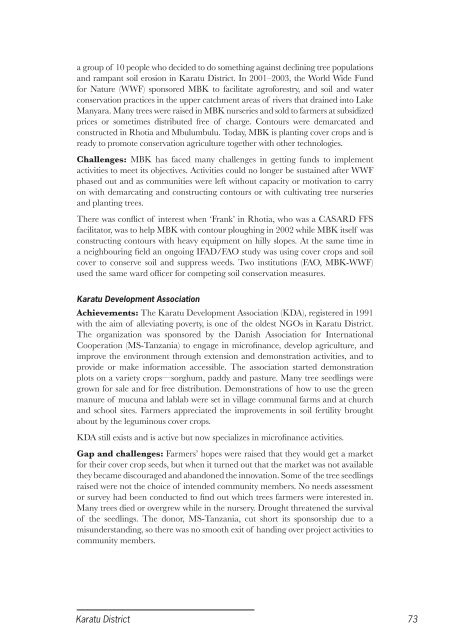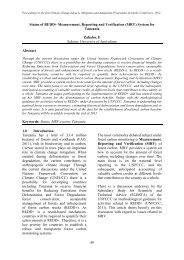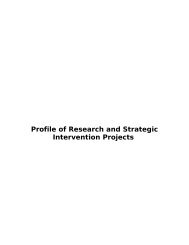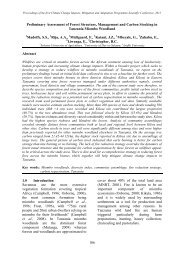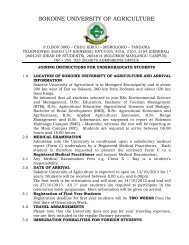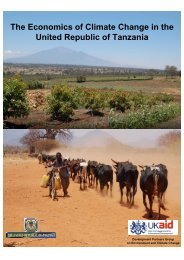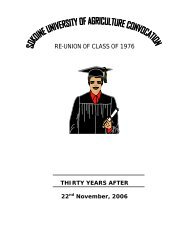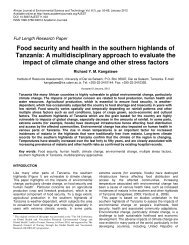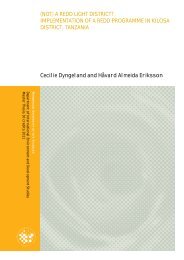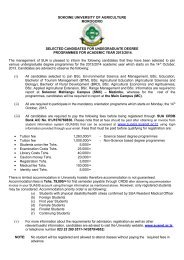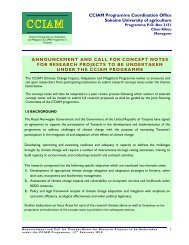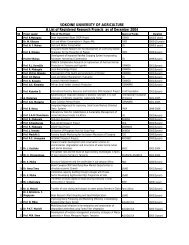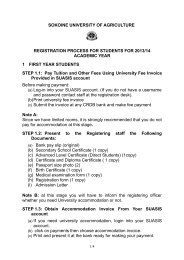Conservation agriculture Tanzania_casestudy.pdf - Sokoine ...
Conservation agriculture Tanzania_casestudy.pdf - Sokoine ...
Conservation agriculture Tanzania_casestudy.pdf - Sokoine ...
- No tags were found...
You also want an ePaper? Increase the reach of your titles
YUMPU automatically turns print PDFs into web optimized ePapers that Google loves.
a group of 10 people who decided to do something against declining tree populationsand rampant soil erosion in Karatu District. In 2001–2003, the World Wide Fundfor Nature (WWF) sponsored MBK to facilitate agroforestry, and soil and waterconservation practices in the upper catchment areas of rivers that drained into LakeManyara. Many trees were raised in MBK nurseries and sold to farmers at subsidizedprices or sometimes distributed free of charge. Contours were demarcated andconstructed in Rhotia and Mbulumbulu. Today, MBK is planting cover crops and isready to promote conservation <strong>agriculture</strong> together with other technologies.Challenges: MBK has faced many challenges in getting funds to implementactivities to meet its objectives. Activities could no longer be sustained after WWFphased out and as communities were left without capacity or motivation to carryon with demarcating and constructing contours or with cultivating tree nurseriesand planting trees.There was conflict of interest when ‘Frank’ in Rhotia, who was a CASARD FFSfacilitator, was to help MBK with contour ploughing in 2002 while MBK itself wasconstructing contours with heavy equipment on hilly slopes. At the same time ina neighbouring field an ongoing IFAD/FAO study was using cover crops and soilcover to conserve soil and suppress weeds. Two institutions (FAO, MBK-WWF)used the same ward officer for competing soil conservation measures.Karatu Development AssociationAchievements: The Karatu Development Association (KDA), registered in 1991with the aim of alleviating poverty, is one of the oldest NGOs in Karatu District.The organization was sponsored by the Danish Association for InternationalCooperation (MS-<strong>Tanzania</strong>) to engage in microfinance, develop <strong>agriculture</strong>, andimprove the environment through extension and demonstration activities, and toprovide or make information accessible. The association started demonstrationplots on a variety crops—sorghum, paddy and pasture. Many tree seedlings weregrown for sale and for free distribution. Demonstrations of how to use the greenmanure of mucuna and lablab were set in village communal farms and at churchand school sites. Farmers appreciated the improvements in soil fertility broughtabout by the leguminous cover crops.KDA still exists and is active but now specializes in microfinance activities.Gap and challenges: Farmers’ hopes were raised that they would get a marketfor their cover crop seeds, but when it turned out that the market was not availablethey became discouraged and abandoned the innovation. Some of the tree seedlingsraised were not the choice of intended community members. No needs assessmentor survey had been conducted to find out which trees farmers were interested in.Many trees died or overgrew while in the nursery. Drought threatened the survivalof the seedlings. The donor, MS-<strong>Tanzania</strong>, cut short its sponsorship due to amisunderstanding, so there was no smooth exit of handing over project activities tocommunity members.Karatu District 73


